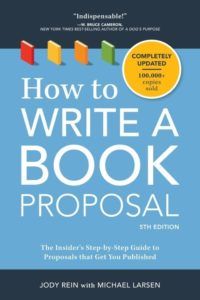How do you start to write a book?
- Start with your goals and vision. What do you want to say and what do you want to accomplish with your book?
- Who do you want to reach with your message?
- How do you want to get your story out into the world? Do you envision starting with a short ebook? A self-help book? A memoir? Turning real life into fiction for more flexibility?
- Can you think of special features to make your book stand out and resonate for your audience?
- Who can help you make this happen? You may want the guidance of a book coach and editor, the help of a researcher, or even a ghostwriter. Will you need a literary agent and a publisher (and a book proposal) or do you plan to self publish?
- Flesh out your book or story idea with an outline and sample pages or chapters.
- If you’re interested in a traditional publisher, you’ll also need a book proposal and query letter.
- Now you’re ready to write your book.
Let’s dig a little deeper into this process.
1. Determine your goals
What do you want to achieve with your book? Being clear about your vision and goals in the beginning will help you make the right choices as you move along this path of learning how to write a book. Your book writing coach can help you clarify your goals.
2. Know your audience
Be clear who you’re writing for and what they want and need. You can’t figure out how to write a book if you don’t know who you’re writing for. If you know your audience well, you may already know what they need and want. If not, you may need to do some research to better understand their needs.
3. Develop Your Book Concept
Here are some of the questions you’ll need to ponder and answer as you conceptualize and write your book:
- How will your book be most useful to your readers? In what format?
- What tone and voice would speak to your anticipated readers and also capture your unique gifts?
- What features would help your readers really get what you’re trying to say?
- What might be in the way of your readers being successful in what your book has to teach? How can you help them overcome these potential blocks?
- What stories will help you illustrate your points?
- What information do your readers need to know?
My Book Writing Starter Kit will take you step by step through the process of writing a book beginning with workbook exercises to help you answer the above questions in more detail. This self-study course will help you organize your book–one of the tasks people find most challenging. You’ll find tools to organize your ideas, to write an outline for your book and to craft an engaging table of contents—one that helps readers see the value of your book when they are thumbing through it to make their buying decision.
If you’re still in the brainstorm, idea-formation stage, you may also want to use The Joy of Writing Journal: Spark Your Creativity in 8 Minutes a Day, to start forming ideas and create a consistent writing practice.
I also offer a book concept consultation, just email me for details and pricing.
Are you writing fiction? Email me to help you find a fiction editor or coach.
4. Write an outline and sample chapters
The more detailed your outline, the easier it will be to write a book. Time spent on your outline is time well spent. Once you have a meaty outline, you can begin writing sample chapters.
You may use your sample chapters in a book proposal, or you may just want to create a typical chapter to use as a template for your other chapters, particularly if you are writing a how-to or self-help book. You may also use your sample chapters to get feedback from readers. Read this article about how to choose sample chapters for a book proposal.
5. Determine your publishing plan
Do you want to self-publish or traditionally publish your book? You may think you can wait to determine this, but it’s actually important to know up front, because the type of publishing you choose will determine your next steps.
If you’re self publishing, skip to step 8.
If you’re looking for a traditional publisher…
6. Write a book proposal

A book proposal is a compelling case for why your book should exist, why it will sell, and how you will help sell it.
Click the link to read this post for the nine basic steps to write a book proposal. The article also includes several links to articles of mine that guide you through some of the more challenging sections of a book proposal and includes insider tips for each of those sections.
You will also want to use the best book to guide you in the book proposal writing process. I personally love Jody Rein’s and Michael Larsen’s book, How to Write a Book Proposal. My clients and I have had great success with it and I know that agents love Michael’s format.
(Don’t make the mistake of a Harvard-educated psychologist I know who sent me a book proposal he wrote using a “Dummies” book. He sent this proposal to a number of agents using the format recommended in the book. One agent outright rejected it and he never heard back from the other two. I knew those agents and asked them to let him revise his proposal and they agreed. In the end, he got an agent and a publisher, and was able to laugh about his mistake, but why waste time when you can get it right the first time?)
What are key elements of a winning book proposal?
- It’s got an important message that needs to be heard by a clearly defined market.
- It’s got a compelling story or powerful information that will attract interest, be easy to promote, and by the way, here’s a promotion plan.
- As the author, you are the best person to bring this book to the world. Your expertise, authority, visibility and reach provide a potent author platform.
If any of these elements is missing, I can help you develop those areas of the proposal, or even develop strategies to expand your author platform and make it more compelling to agents and publishers. E-mail me to explore.
7. How do you find a literary agent?
- Identify potential literary agents by researching the agents for books similar to yours (Hint: Look in the acknowledgements section).
- Meet agents at conferences such as Harvard Medical School’s CME publishing course or the International Women’s Writing Guild.
- Read about agents online and in books. Who is interested in topics like yours?
- Send a query letter to potential literary agents only when your proposal is complete.
DO NOT send them the whole book proposal. That’s a sure way to have your proposal end up in the slush pile and maybe never hear back. Your query letter will allow literary agents to decide whether they’re interested in your book. If they are, they will invite you to send them your book proposal. Of course, if you’ve met an agent at a conference and they said to send them your proposal, you can skip this step and just send your book proposal with a cover letter.
8. Send your book proposal to interested agents
It used to be you could only send your book proposal to one literary agent at a time, but nowadays most agents accept and expect you will send it to a handful at once. Don’t send your book proposal to too many agents. You may get valuable feedback on something you need to change, and you wouldn’t want to burn all your bridges by sending it out without having gotten some feedback. Make sure the subject line of your email indicates that this is material they requested to see. Also, be sure to follow their submissions guidelines.
Note: Some authors have enough of a platform and a fresh, relevant book idea to interest publishers, but perhaps they are likely to get a very small advance. This will make it hard to attract an agent. In such cases, you may decide to query publishers directly. Read the submissions guidelines on their website to see if they accept author queries and to find out exactly what they want.
9. Time to finally write your book and complete it.
You’ve done the early work of defining your book concept, vision, market, features, tone, etc. You’ve created a detailed structure or outline. You’ve even created a couple of sample chapters.
Now, get some feedback from your readership, people who are in your target market.
Then, using your outline, write the rest of the book. You don’t have to write it in order. Feel free to skip around and write whatever you feel drawn to from your outline. You may even have ideas for new sections not in your outline. That’s fine if you’re self-publishing. If you’ve signed a contract based on your proposal, you may want to check with your agent or acquisitions editor before making substantial changes, such as adding a new chapter.
If you’re serious about getting that book done, look into my Bring Your Book to Life® Program or sign up for a one hour book consultation here. I specialize in nonfiction (self-help, how-to, business, health, some memoir or narrative nonfiction). I can also refer you to a colleague for other genres.
If you’re writing fiction, check out my colleague, C.S. Lakin’s fiction writing courses.













